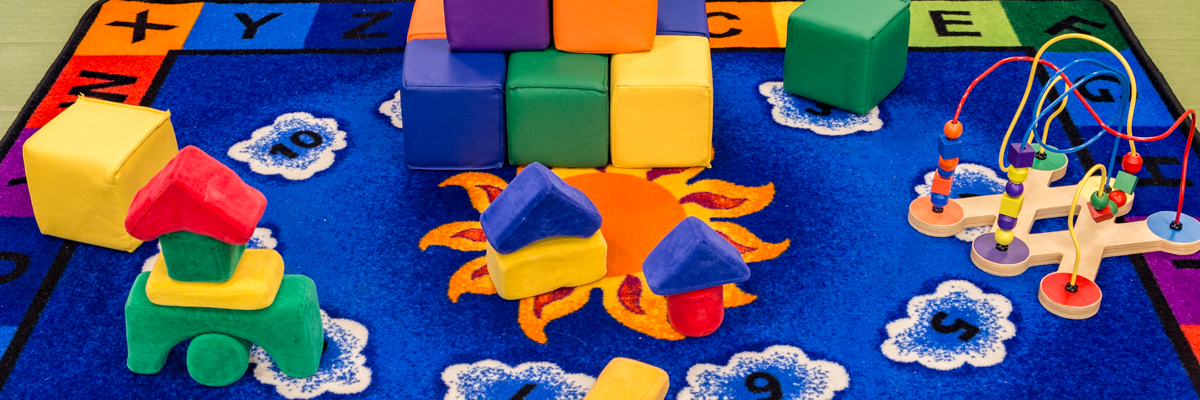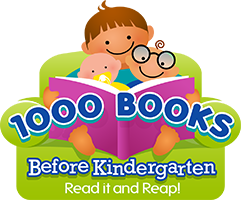
What is Early Literacy?
Our library’s early literacy programs are derived from the American Library Association’s Every Child Ready to Read program, a research-based series of practices that can help young children develop essential literacy skills that will help prepare them for reading, school readiness and student success.
Early literacy is what children know about reading and writing before they can read and write. Babies chew on board books. Toddlers learn how to turn pages and hold books. Preschoolers discover that adults are not reading the pictures, but the words on the pages. All of these are examples of early literacy.
What Do Parents & Caregivers Need to Know?
Learning to read begins at birth. Parents and caregivers are a child’s first and best teacher.
We utilize early literacy practices during our storytimes and for various activities in the department. Using the five simple but effective practices, parents and caregivers can help children develop early literacy skills that will get them ready to read.
Five Practices of Early Literacy
Talking with children helps them learn oral language, one of the most critical early literacy skills. Children learn about language by listening to parents talk and joining in the conversation.
Music helps children hear the smaller sounds of words and builds vocabulary. Singing slows down language so children can hear different parts of words and notice how they are alike and different.
Reading together develops vocabulary and comprehension, nurtures a love for reading, and motivates children to want to learn to read.
Children become aware that printed letters stand for spoken words as they see print used in their daily lives.
Children learn about language through different kinds of play. While playing children put thoughts into words and talk about what they are doing.
Library Storytimes
Help your baby grow up to love books! Caregivers and little ones share stories, songs, and rhymes in this lapsit program. Introduce them to a lifetime of reading and language enjoyment.
Disclaimer(s)
Storytime Accompanying Adults
This storytime works best if there is one child to one adult. Participation of caregivers with their child is important in order to help them learn while they are having fun.
Help your baby grow up to love books! Caregivers and little ones share stories, songs, and rhymes in this lapsit program. Introduce them to a lifetime of reading and language enjoyment.
Disclaimer(s)
Storytime Accompanying Adults
This storytime works best if there is one child to one adult. Participation of caregivers with their child is important in order to help them learn while they are having fun.
Introduce your toddler to early literacy and help build a foundation for reading. We pair engaging books with songs and rhymes. Toddlers and caregivers love to dance and listen during our time together.
Disclaimer(s)
Storytime Accompanying Adults
This storytime works best if there is one child to one adult. Participation of caregivers with their child is important in order to help them learn while they are having fun.
Introduce your toddler to early literacy and help build a foundation for reading. We pair engaging books with songs and rhymes. Toddlers and caregivers love to dance and listen during our time together.
Disclaimer(s)
Storytime Accompanying Adults
This storytime works best if there is one child to one adult. Participation of caregivers with their child is important in order to help them learn while they are having fun.
Introduce your toddler to early literacy and help build a foundation for reading. We pair engaging books with songs and rhymes. Toddlers and caregivers love to dance and listen during our time together.
Disclaimer(s)
Storytime Accompanying Adults
This storytime works best if there is one child to one adult. Participation of caregivers with their child is important in order to help them learn while they are having fun.
Hear stories, sing songs, and have fun with friends! This storytime highlights early literacy skills that prepare children for reading independently. Children attend this storytime without adults so they can practice being independent.
Disclaimer(s)
Storytime without Adults
Children attend this storytime without their grown-ups so that they can practice independence.
1,000 Books Before Kindergarten

Do you want to set your child on the path to success? Sign up for 1,000 Books Before Kindergarten!
The goal of this program is to read 1,000 books (don’t worry, you can repeat books!) before your child starts kindergarten.
To participate, pick up a 1,000 Books starter pack from the Youth Services desk. Using your reading log, track the titles of the books you read with your child. Check in with Youth Services staff members after every 100 books to receive a sticker and a new reading log to add to your folder. When the program is completed the children will receive a special certificate and a book to keep in honor of their hard work.